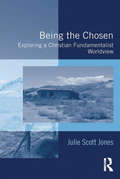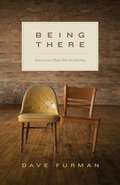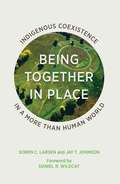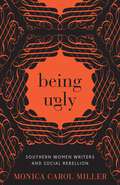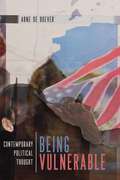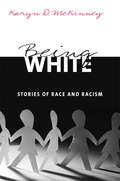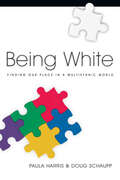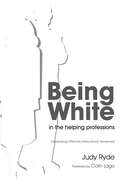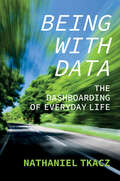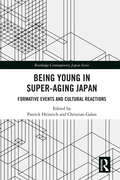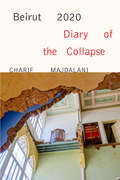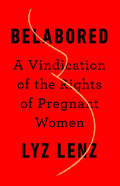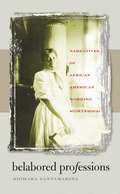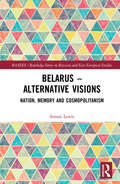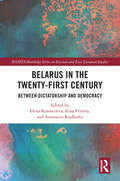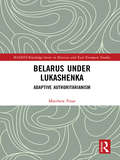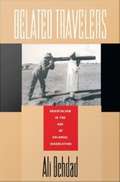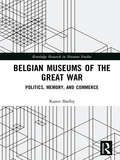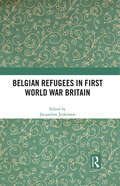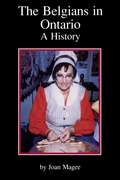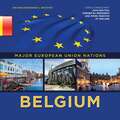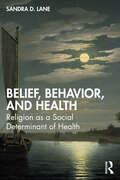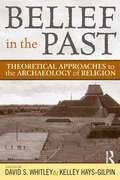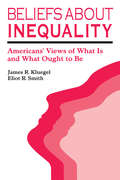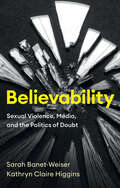- Table View
- List View
Being the Chosen: Exploring a Christian Fundamentalist Worldview
by Julie Scott JonesBeing the Chosen explores Christian fundamentalism in the USA, focusing particularly on the belief system of Protestant fundamentalists. It establishes the key characteristics of the Protestant worldview, investigating the degrees to which these are adhered to amongst different groups and how such belief systems are constructed and reinforced through everyday life. By presenting rich empirical material, Being the Chosen sheds light on the manner in which the Protestant fundamentalist worldview shapes and constructs the beliefs and actions of its adherents, providing them with agency and reinforcement in the face of oppositional forces. As such, it will interest not only sociologists, but also scholars of religion and the culture and society of the USA.
Being There: How to Love Those Who Are Hurting
by Dave FurmanWriting from the unique perspective of one who needs care on a daily basis, Dave Furman offers support, wisdom, and encouragement to those who are called to serve others who are hurting.
Being Together in Place: Indigenous Coexistence in a More Than Human World
by Soren C. Larsen Jay T. JohnsonBeing Together in Place explores the landscapes that convene Native and non-Native people into sustained and difficult negotiations over their radically different interests and concerns. Grounded in three sites—the Cheslatta-Carrier traditional territory in British Columbia; the Wakarusa Wetlands in northeastern Kansas; and the Waitangi Treaty Grounds in Aotearoa/New Zealand—this book highlights the challenging, tentative, and provisional work of coexistence around such contested spaces as wetlands, treaty grounds, fishing spots, recreation areas, cemeteries, heritage trails, and traditional village sites. At these sites, activists learn how to articulate and defend their intrinsic and life-supportive ways of being, particularly to those who are intent on damaging or destroying these places. Using ethnographic research and a geographic perspective, Soren C. Larsen and Jay T. Johnson show how the communities in these regions challenge the power relations that structure the ongoing (post)colonial encounter in liberal democratic settler-states. Emerging from their conversations with activists was a distinctive sense that the places for which they cared had agency, a &“call&” that pulled them into dialogue, relationships, and action with human and nonhuman others. This being-together-in-place, they find, speaks in a powerful way to the vitalities of coexistence: where humans and nonhumans are working to decolonize their relationships; where reciprocal guardianship is being stitched back together in new and unanticipated ways; and where a new kind of &“place thinking&” is emerging on the borders of colonial power.
Being Ugly: Southern Women Writers and Social Rebellion (Southern Literary Studies)
by Monica Carol MillerIn the South, one notion of “being ugly” implies inappropriate or coarse behavior that transgresses social norms of courtesy. While popular stereotypes of the region often highlight southern belles as the epitome of feminine power, women writers from the South frequently stray from this convention and invest their fiction with female protagonists described as ugly or chastised for behaving that way. Through this divergence, “ugly” can be a force for challenging the strictures of normative southern gender roles and marriage economies. In Being Ugly: Southern Women Writers and Social Rebellion, Monica Carol Miller reveals how authors from Margaret Mitchell to Monique Truong employ “ugly” characters to upend the expectations of patriarchy and open up more possibilities for southern female identity. Previous scholarship often conflates ugliness with such categories as the grotesque, plain, or abject, but Miller disassociates these negative descriptors from a group of characters created by southern women writers. Focusing on how such characters appear prone to rebellious and socially inappropriate behavior, Miller argues that ugliness subverts assumptions about gender by identifying those who are unsuitable for the expected roles of marriage and motherhood. As opposed to familiar courtship and marriage plots, Miller locates in fiction by southern women writers an alternative genealogy, the ugly plot. This narrative tradition highlights female characters whose rebellion offers a space for re-imagining alternative lives and households in opposition to the status quo. Reading works by canonical writers like Zora Neale Hurston, Flannery O’Connor, and Eudora Welty, along with recent texts by contemporary authors like Helen Ellis, Lee Smith, and Jesmyn Ward, Being Ugly offers an important new perspective on how southern women writers confront regressive ideologies that insist upon limited roles for women.
Being Vulnerable: Contemporary Political Thought (Outspoken)
by Arne De BoeverWe are living in a time of acute vulnerability. From climate change to drone warfare, terrorist attacks to mass shootings, safe spaces to trigger warnings, not to mention the COVID-19 pandemic, homo vulnerabilis is once again coming to terms with the fact that it can be wounded, or even killed.Against such finitude, sovereignty is now reasserting itself as a political power that might save us from our ontological state. The irony is, of course, that such sovereignty – for example through camps, walls, police violence, or drones – is also the underlying, historical cause of many of our most intense contemporary experiences of vulnerabilization. Interrupting the dialectic by which sovereignty manages to be both the cause of our vulnerabilization and the phantasmatic tool of its prevention, in Being Vulnerable Arne De Boever explores how today’s experiences of vulnerabilization can be translated into a collective human power that dismantles the form of sovereignty that is producing this state of affairs. Focused on theories, paradigms, and alternative formations of sovereignty, Being Vulnerable reconsiders the tradition of thinking through a political concept in order to approach it anew.
Being White: Stories of Race and Racism
by Karyn D. McKinneyKaryn McKinney uses written autobiographies solicited from young white people to empirically analyze the contours of the white experience in U.S. society. This text offers a unique view of whiteness based on the rich data provided by whites themselves, writing about what it means to be white.
Being White: Finding Our Place in a Multiethnic World
by Doug Schaupp Paula HarrisWhat does it mean to be white? When you encounter people from other races or ethnicities, you may become suddenly aware that being white means something. Those from other backgrounds may respond to you differently or suspiciously. You may feel ambivalence about your identity as a white person. Or you may feel frustrated when a friend of another ethnicity shakes his head and says, "You just don't get it because you're white."So, what does it mean to be white?How can you overcome the mistakes of the past?How can you build authentic relationships with people from other races and ethnicities?So what do I do?
Being White in the Helping Professions: Developing Effective Intercultural Awareness
by Judy RydeIn this reflective yet practical book, the author challenges white helping professionals to recognize their own cultural identity and the impact it has when practising in a multicultural environment. Judy Ryde reveals how white people have implicit and explicit advantages and privileges that often go unnoticed by them. She suggests that in order to work effectively in a multicultural setting, this privilege needs to be fully acknowledged and confronted. She explores whether it is possible to talk about a white identity, addresses uncomfortable feelings such as guilt or shame, and offers advice on how to implement white awareness training within an organization. Ryde offers a model for 'white awareness' in a diverse society and provides concrete examples from her own experience. This book is essential reading for students and practitioners in the helping professions, including social workers, psychotherapists, psychologists, counsellors, healthcare workers, occupational therapists and alternative health practitioners.
Being with Data: The Dashboarding of Everyday Life
by Nathaniel TkaczOnce the rarified stuff of scientists and statisticians, data are now at the heart of our global digital economy, transforming everything from how we perceive the value of a professional athlete to the intelligence gathering activities of governments. We are told that the right data can turn an election, help predict crime, improve our businesses, our health and our capacity to make decisions. Beginning with a simple question - how do most people encounter and experience data? - Nathaniel Tkacz sets out on a path at odds with much of the contemporary discussion about data. When we encounter data, he contends, it is often in highly routinised ways, through formatted displays and for specific cognitive tasks. What data are and can do is largely a matter of how they are formatted. To understand our 'datafied' societies, we need to turn our attention to data's formats and the powers of formatting. This book offers an account of one such format: the dashboard. From their first appearance with the horse and carriage, Tkacz guides readers on the historical development of this format. Through analyses of car dashboards, early managerial dashboards, and the gradual emergence of dashboards as a computer display technology, Tkacz shows how today's digital dashboards came to be, and how their cultural history conditions the present. Highly original and wide-ranging, this book will change how you think about data.
Being Young in Super-Aging Japan: Formative Events and Cultural Reactions (Routledge Contemporary Japan Series)
by Patrick Heinrich Christian GalanJapan is not only the oldest society in the world today, but also the oldest society to have ever existed. This aging trend, however, presents many challenges to contemporary Japan, as it permeates all areas of life, from the economy and welfare to social cohesion and population decline. Nobody is more affected by these changes than the young generation. This book studies Japanese youth in the aging society in detail. It analyses formative events and cultural reactions. Themes include employment, parenthood, sexuality, but also art, literature and language, thus demonstrating how the younger generation can provide insights into the future of Japanese society more generally. This book argues that the prolonged crisis resulted in a commonly shared destabilization of thoughts and attitudes and that this has shaped a new generation that is unlike any other in post-war Japan. Presenting an inter-disciplinary approach to the study of the aging trend and what it implies for young Japanese, this book will be useful to students and scholars of Japanese culture and society, as well cultural anthropology and demography.
Beirut 2020: Diary of the Collapse
by Charif MajdalaniTold in elegant, evocative prose, a devastating and necessary testament to the August explosion that thoughtfully examines the crises that preceded it and its aftermath.At the start of the summer of 2020, in a Lebanon ruined by economic crisis and political corruption, in an exhausted Beirut still rising up for true democracy while the world was paralyzed by the coronavirus, Charif Majdalani set about writing a journal. He intended to bear witness to this terrible, confusing time, and perhaps endure it by putting it into words. Using small, everyday interactions—with fellow restaurant patrons, repairmen, the father of his wife&’s patient, a young Syrian refugee—as openings to address larger systemic problems, he explains how events in Lebanon&’s recent history led to this point.Then, on August 4, the explosion of 2,750 tons of ammonium nitrate in the port of Beirut devastated the city and the country. Majdalani&’s chronicle suddenly became a record of the catastrophe, which left more than two hundred dead and thousands injured, and the massive public outcry that followed. In the midst of the senseless chaos and grief, however, he continues to find cause for hope in the kindness and resilience of those determined to stay and rebuild.
Belabored: A Vindication of the Rights of Pregnant Women
by Lyz LenzIn Belabored, Lyz Lenz will "make you cry in one paragraph and snort-laugh in the next." (Chloe Angyal, contributing editor at MarieClaire.com)Written with a blend of wit, snark, and raw intimacy, Belabored is an impassioned and irreverent defense of the autonomy, rights, and dignity of pregnant people. Lenz shows how religious, historical, and cultural myths about pregnancy have warped the way we treat pregnant people: when our representatives enact laws criminalizing abortion and miscarriage, when doctors prioritize the health of the fetus over the life of the pregnant patient in front of them, when baristas refuse to serve visibly pregnant women caffeine. She also reflects on her own experiences of carrying her two children and seeing how the sacrifices demanded during pregnancy carry over seamlessly into the cult of motherhood, where women are expected to play the narrowly defined roles of "wife" and "mother" rather than be themselves.Belabored is an urgent call for us to trust women and let them choose what happens to their own bodies, from a writer who "is on a roll" (Bitch Magazine).
Belabored Professions
by Xiomara SantamarinaAccording to nineteenth-century racial uplift ideology, African American women served their race best as reformers and activists, or as "doers of the word." In Belabored Professions, Xiomara Santamarina examines the autobiographies of four women who diverged from that ideal and defended the legitimacy of their self-supporting wage labor.Santamarina focuses on The Narrative of Sojourner Truth, Eliza Potter's A Hairdresser's Experience in High Life, Harriet Wilson's Our Nig, and Elizabeth Keckley's Behind the Scenes. She argues that beyond black reformers' calls for abolitionist work, these former slaves and freeborn black women wrote about their own overlooked or disparaged work as socially and culturally valuable to the nation. They promoted the status of wage labor as a mark of self-reliance and civic virtue when many viewed African American working women as "drudges." As Santamarina demonstrates, these texts offer modern readers new perspectives on the emergence of the vital African American autobiographical tradition, dramatizing the degree to which black working women participated in and shaped American rhetorics of labor, race, and femininity.
Belarus - Alternative Visions: Nation, Memory and Cosmopolitanism (BASEES/Routledge Series on Russian and East European Studies)
by Simon M. LewisBelarus is often regarded as "Europe’s last dictatorship", a sort-of fossilized leftover from the Soviet Union. However, a key factor in determining Belarus’s development, including its likely future development, is its own sense of identity. This book explores the complex debates and competing narratives surrounding Belarus’s identity, revealing a far more diverse picture than the widely accepted monolithic post-Soviet nation. It examines in a range of media including historiography, films and literature how visions of Belarus as a nation have been constructed from the nineteenth century to the present day. It outlines a complex picture of contested myths – the "peasant nation" of the nineteenth century, the devoted Soviet republic of the late twentieth century and the revisionist Belarusian nationalism of the present. The author shows that Belarus is characterized by immense cultural, linguistic and ethnic polyphony, both in its lived history and in its cultural imaginary. The book analyses important examples of writing in and about Belarus, in Belarusian, Polish and Russian, revealing how different modes of rooted cosmopolitanism have been articulated.
Belarus in the Twenty-First Century: Between Dictatorship and Democracy (BASEES/Routledge Series on Russian and East European Studies)
by Elena Korosteleva, Irina Petrova, and Anastasiia KudlenkoThis book presents a comprehensive overview of current developments in Belarus. It explores how there has been an upswelling of popular support for the idea that Belarus must change. It highlights how the old regime, aiming to retain the Soviet legacy, reluctant to reform, presiding over worsening economic conditions and refusing to take measures to cope with the COVID-19 pandemic, has been confronted by increasing bottom-up and horizontal social mobilisation which demands a transformation of state-society relations and a new sense of Belarusian peoplehood. The book outlines how the current situation has developed, considers how the present demands for change are deep-seated and long-brewing trends, and reveals much detail about many aspects of the growing societal mobilisation. Overall, the book demonstrates that, although the old regime remains in power, Belarusian society has changed fundamentally, thereby bringing great hope that change will eventually come about.
Belarus under Lukashenka: Adaptive Authoritarianism (BASEES/Routledge Series on Russian and East European Studies)
by Matthew FrearThis book explores the nature of the regime of Aliaksandr Lukashenka, who has ruled Belarus since 1994, and who is often characterized as "the last dictator in Europe". It discusses how Lukashenka came to power, providing a survey of politics in Belarus in early post-Soviet times, examines how power became personalized under his regime, and considers how he coerced opponents, whilst maintaining good popular support. The book discusses all aspects of politics, including presidential power, the ruling elites, elections, the opposition, and civil society. The author characterizes Lukashenka’s rule as "adaptive authoritarianism", and demonstrates how the regime’s avoidance of any ideology, even nationalism, permits great freedom of manoeuvre, enabling pragmatic adaptation to changing circumstances.
Belated Travelers: Orientalism in the Age of Colonial Dissolution
by Ali BehdadIn Belated Travelers, Ali Behdad offers a compelling cultural critique of nineteenth-century travel writing and its dynamic function in European colonialism. Arriving too late to the Orient, at a time when tourism and colonialism had already turned the exotic into the familiar, late nineteenth-century European travelers to the Middle East experienced a sense of belatedness, of having missed the authentic experience once offered by a world that was already disappearing. Behdad argues that this nostalgic desire for the other contains an implicit critique of Western superiority, a split within European discourses of otherness. Working from these insights and using analyses of power derived from Foucault, Behdad engages in a new critique of orientalism. No longer viewed as a coherent and unified phenomenon or a single developmental tradition, it is seen as a complex and shifting field of practices that has relied upon its own ambivalence and moments of discontinuity to ensure and maintain its power as a discourse of dominance. Through readings of Flaubert, Nerval, Kipling, Blunt, and Eberhardt, and following the transition in travel literature from travelog to tourist guide, Belated Travelers addresses the specific historical conditions of late nineteenth-century orientalism implicated in the discourses of desire and power. Behdad also views a broad range of issues in addition to nostalgia and tourism, including transvestism and melancholia, to specifically demonstrate the ways in which the heterogeneity of orientalism and the plurality of its practice is an enabling force in the production and transformation of colonial power. An exceptional work that provides an important critique of issues at the forefront of critical practice today, Belated Travelers will be eagerly awaited by specialists in nineteenth-century British and French literatures, and all concerned with colonial and post-colonial discourse.
Belgian Museums of the Great War: Politics, Memory, and Commerce (Routledge Research in Museum Studies)
by Karen ShelbyBelgian Museums of the Great War: Politics, Memory, and Commerce examines the handling of the centennial of World War I by several museums along the Western Front in Flanders, Belgium. In the twenty-first century, the museum has become a strategic space for negotiating ownership of and access to knowledge produced in local settings. The specific focus on museums and commemorative events in Flanders allows for an in-depth evaluation of how each museum works with the remembrance and tourist industry in the region while carving a unique niche. Belgian Museums of the Great War writes the history of these institutions, analyzes the changes made in advance of the anniversary years, and considers the site-specificity of each institution and its architectural frame. Since museums not only transmit information but also shape knowledge, as Eileen Hooper-Greenhill has noted, the diverse narratives and community programs sponsored by each museum have served to challenge prior historiographies of the war. Through newly revamped interactive environments, self-guided learning, and an emphasis on the landscape, the museums in Flanders have a significant role to play in the ever-changing dialogue on the meaning of the history and remembrance of the Great War.
Belgian Refugees in First World War Britain
by Jacqueline JenkinsonAround 250,000 Belgian refugees who fled the German invasion spent the First World War in Britain – the largest refugee presence Britain has ever witnessed. Welcomed in a wave of humanitarian sympathy for ‘Poor Little Belgium’, within a few months Belgian exiles were pushed off the front pages of newspapers by the news of direct British involvement in the war. Following rapid repatriation at British government expense in late 1918 and 1919 Belgian refugees were soon lost from public memory with few memorials or markers of their mass presence.Reactions to Belgian refugees discussed in this book include the mixed responses of local populations to the refugee presence, which ranged from extensive charitable efforts to public and trade union protests aimed at protecting local jobs and housing. This book also explores the roles of central and local government agencies which supported and employed Belgian refugees en masse yet also used them as a propaganda tool to publicise German outrages against civilians to encourage support for the Allied war effort. This book covers responses to Belgian refugees in England, Scotland, Ireland and Wales in a Home Front wartime episode which generated intense public interest and charitable and government action. This book was originally published as a special issue of Immigrants and Minorities: Historical Studies in Ethnicity, Migration and Diaspora.
The Belgians in Ontario: A History
by Joan MageeThe Belgians in Ontario chronicles more than 300 years of Belgian presence in Ontario, beginning with Father Louis Hennepin, the Recollet missionary who accompanied La Salle on his explorations. This book examines the contributions of the Belgian community in a diverse range of activities including agriculture, sports, and the arts. Magee offers a detailed analysis of reasons and methods of immigration (including a study of the pioneering agricultural labourers who participated in the swallow migration). Of special interest to students of social and ethnic studies is the extensive survey of Belgian Canadians, reflecting their attitudes and experiences. Lavishly illustrated with more than 50 rare photographs culled from private and public collections, The Belgians in Ontario is a visually-interesting look at the many contributions of a determined people.
Belgium (Major European Union Nations)
by Ida WalkerAlthough Belgium is a small country, it is a big player in Europe. It was a founding member of the EU back in 1952. Today, Brussels, its capital city, is one of the EU's centers. Despite being divided between French and Dutch speakers, Belgium is a strong country with a lot going on culturally and politically. Discover more about this exciting, modern nation!
Belief, Behavior, and Health: Religion as a Social Determinant of Health
by Sandra D. LaneThis book uniquely examines, across cultures, the health benefits and detriments of religious beliefs, with important implications for individual wellbeing and human survival.Belief, Behavior, and Health takes the reader through journeys of the author’s research in the Middle East, Africa, and the urban United States, where she focused on the unequal health and survival of women globally and vulnerable groups in the United States. Almost every health problem, especially those experienced by the poor and disadvantaged, arose from or was made worse by the conditions in the environment in which people lived. Lane’s detailed studies of beliefs about Judaism, Christianity, and Islam led to the author’s deep observations on how religious belief and practice, as well as discrimination due to religious prejudice, can be a major influence on health, both positively and negatively. In this book, Lane shows how religious precepts and cultural influences on religious behavior function as social determinants of health. An accessible and compelling read, this book will appeal to students and scholars of public health, anthropology, and sociology and those interested in the influence of religion on health outcomes.
Belief in the Past: Theoretical Approaches to the Archaeology of Religion
by David S. Whitley Kelley Hays-GilpinHuman actions are often deeply intertwined with religion and can be understood in a strictly religious context. Yet, many volumes and articles pertaining to discussions of religion in the archaeological past have focused primarily on the sociopolitical implications of such remains. The authors in this volume argue that while these interpretations certainly have a meaningful place in understanding the human past, they provide only part of the picture. Because strictly religious contexts have often been ignored, this has resulted in an incomplete assessment of religious behavior in the past. This volume considers exciting new directions for considering an archaeology of religion, offering examples from theory, tangible archaeological remains, and ethnography.
Beliefs about Inequality: Americans' Views of What is and What Ought to be
by James R. Kluegel Eliot R. SmithMotivated by the desire to explain how Americans perceive and evaluate inequality and related programs and policies, the authors conducted a national survey of beliefs about social and economic inequality in America. Here they present the results of their research on the structure, determinants, and certain political and personal consequences of these beliefs. The presentations serve two major goals; to describe and explain the central features of Americans' images of inequality. Beliefs About Inequality begins with a focus on people's perceptions of the most basic elements of inequality: the availability of opportunity in society, the causes of economic achievements, and the benefits and costs of equality and inequality. The book's analysis of the public's beliefs on these key issues is based on fundamental theories of social psychology and lays the groundwork for understanding how Americans evaluate inequality-related policies. The authors discuss the ultimate determinants of beliefs and the implications of their findings for social policies related to inequality. They propose that attitudes toward economic inequality and related policy are influenced by three major aspects of the current American social, economic, and political environment: a stable "dominant ideology" about economic inequality; individuals' social and economic status; and specific beliefs and attitudes, often reflecting "social liberalism" shaped by recent political debates and events.
Believability: Sexual Violence, Media, and the Politics of Doubt
by Sarah Banet-Weiser Kathryn Claire HigginsThe #MeToo movement has created more opportunities for women to speak up about sexual assault and harassment. But we are also living in a time when “fake news” and “alternative facts” call into question the very nature of truth. For questions about sexual violence, who do we believe and why? And how do the answers change when the very idea of “truth” is in question?This troubling paradox is at the heart of this book. The convergence of the #MeToo movement and the crisis of post-truth is used to explore the experiences of women and people of color whose credibility around issues of sexual violence is often in doubt. Offering a feminist re-thinking of “post-truth”, Banet-Weiser and Higgins shift the lens from truth to “believability” to investigate how the gendered and racialized logics of this concept are defined and contested within media culture. Drawing on analysis of a wide variety of media texts and products including film, news articles, social media campaigns, and wearable technologies, the authors propose that an “economy of believability’” is a necessary framework for understanding the context in which public bids for truth about sexual violence are made, negotiated, and authorized. Believability interrogates this economy as one in which powerful white men have historically wielded disproportionate influence – so, an economy which is deeply structured by gender and race.Timely and compelling, this book makes a provocative intervention into scholarly and popular debates about the character of believability when women speak up about sexual assault. It will appeal to scholars and students across the social sciences and humanities as well as general readers.
